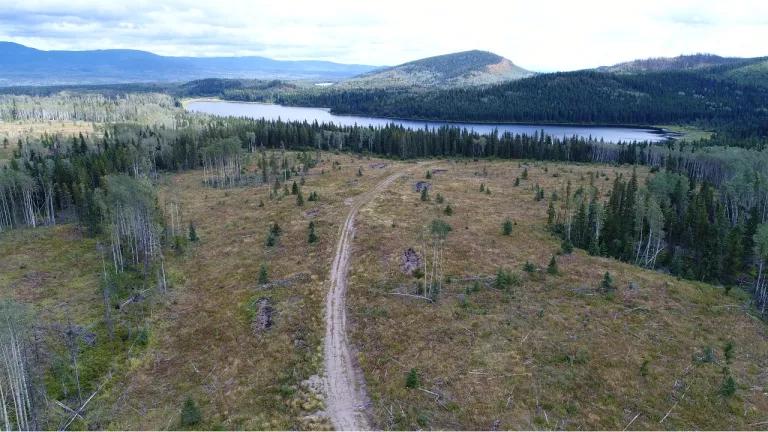650+ Scientists Urge Stop to Burning Trees for Energy
The scientists' letter outlines the impacts of logging whole trees for biomass—and how that logging undermines the commitments countries are negotiating at this year's biodiversity conference.

Clearcutting in Estonia
More than 650 scientists have signed a letter to world leaders asking them to stop burning trees to make energy as the 15th Meeting of the Convention on Biological Diversity (CBD CoP15) begins this week.
While scientists have rallied to highlight the detrimental impacts of biomass energy in the past, they’ve typically focused on its horrific climate impacts. Indeed, bioenergy worsens climate change, emitting as much CO2 at the smokestack as coal.
Less discussed are the devastating affects of bioenergy on global biodiversity, which includes clearcutting of forests like Canada's Boreal, a biodiversity hotspot in the U.S. Southeast, and nature reserves in the Baltics. As one of the letter's lead authors, Professor William Moomaw, wrote: “Our forests are the most biodiverse places on the planet, providing habitat for countless species. They are also absorbing nearly 30% of all global emissions from burning fossil fuels. Clearcutting for forest bioenergy is degrading the south-east US coastal forests, a global biodiversity hotspot, the Baltic states in Europe, boreal forests in Canada, and illegally cutting protected forest ecosystems in the Carpathians of eastern Europe. These are all home to irreplaceable rare plant species, mammals, and migratory and residential birds.”
While the bioenergy industry has long-claimed that it doesn't impact biodiversity since it makes wood pellets to burn for bioenergy from the "wastes and residues of logging operations," increasing evidence shows that they routinely clearcut whole forests of trees (e.g., here, here, and here). An account in Mongabay from a former wood pellet company employee released just yesterday further confirmed this, with the former employee stating: “We take giant, whole trees. We don’t care where they come from. The notion of sustainably managed forests is nonsense. We can’t get wood into the mills fast enough.”
The letter not only outlines the impacts of logging whole trees for biomass, but also points out that such logging undermines commitments countries are negotiating at CBD COP15, including the target to protect 30% of land and sea by 2030 and to redirect anti-nature subsidies to pro-nature subsidies to fill the $600-$800 billion dollar "conservation gap."
The letter was drafted by scientists that know their stuff when it comes to biodiversity: Prof Alexandre Antonelli, director of science at London's Kew Gardens; Prof William Moomaw from the United States' Tufts University; Professor Ülo Niinemets from Estonia's University of Tartu, and Professor Emeritus Jay R. Malcolm from Canada's University of Toronto.
“The best thing for the climate and biodiversity is to leave forests standing – and biomass energy does the opposite,” the letter states. “The world’s wildlife is already vanishing, and the bioenergy industry is helping to accelerate that by destroying precious forest habitats.”
More than 650 scientists have signed a letter to world leaders asking them to stop burning trees to make energy as the 15th Meeting of the Convention on Biological Diversity (CBD CoP15) begins this week.
While scientists have rallied to highlight the detrimental impacts of biomass energy in the past, they’ve typically focused on its horrific climate impacts. Indeed, bioenergy worsens climate change, emitting as much CO2 at the smokestack as coal.



